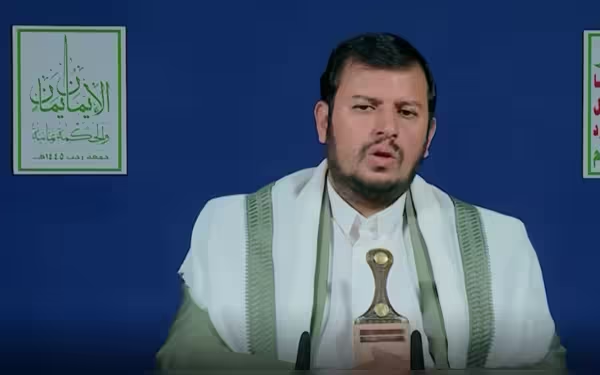Saturday, November 16, 2024 07:32 PM
Houthi Leader Al-Houthi Backs Iran Against Israel
- Al-Houthi pledges support for Iran amid rising tensions.
- Houthis claim over 1,000 missile strikes against Israel.
- Yemeni government struggles to evacuate citizens from Lebanon.
 Image Credits: arabnewspk
Image Credits: arabnewspkHouthi leader Al-Houthi pledges support for Iran against Israel, escalating regional tensions and impacting Yemen's citizens.
In a significant escalation of rhetoric and military threats, Abdul Malik Al-Houthi, the leader of Yemen's Houthi militia, has publicly pledged unwavering support for Iran in the event of an attack by Israel. This declaration comes as tensions in the region continue to rise, particularly on the eve of the first anniversary of Hamas' attack on Israel on October 7. Al-Houthi's statements reflect a broader alignment with Iran and its allies, including Hezbollah in Lebanon and various factions in Iraq, as they collectively oppose Israeli actions in the Palestinian territories.
During his speech, Al-Houthi emphasized his commitment to continue launching missiles and drones at Israel, claiming that his forces have already targeted 193 ships and Israel itself with over 1,000 ballistic missiles and drones since November. He framed these actions as part of a humanitarian and moral obligation to support the Palestinian people and their struggle against Israeli military operations. Al-Houthi's rhetoric is not just about military might; it also seeks to galvanize public support within Yemen, urging his followers to demonstrate in solidarity with Lebanon, Palestine, and Iran.
Al-Houthi's remarks come in the wake of recent military actions by the U.S. Central Command, which targeted Houthi military capabilities in various Yemeni cities. This military engagement highlights the ongoing conflict in Yemen, where the Houthis have been involved in a series of aggressive maritime operations, including the capture and sinking of commercial vessels. The Houthis assert that their attacks are aimed solely at ships linked to Israel or those visiting Israeli ports, as part of their strategy to pressure Israel to cease its military actions in Gaza.
Meanwhile, the Yemeni government is facing challenges in evacuating its citizens stranded in Lebanon due to the ongoing conflict. Recent Israeli airstrikes have disrupted vital routes for those attempting to flee the violence. The Yemeni Embassy in Lebanon has proposed a land evacuation plan, but many stranded Yemenis have rejected this, insisting on air or sea transport instead. The situation for these individuals is dire, with rising living costs and deteriorating conditions in Lebanon exacerbating their plight.
In a tragic turn of events, reports have emerged of Yemeni nationals being killed in Israeli airstrikes, further underscoring the human cost of the ongoing conflict. Additionally, the Houthi militia has intensified its crackdown on dissent within Yemen, with reports of abductions of individuals who criticize their actions or celebrate historical events like the 1962 revolution. This crackdown raises serious concerns about freedom of expression and human rights in areas controlled by the Houthis.
As the situation continues to evolve, the implications of Al-Houthi's pledge of support for Iran and the ongoing military actions in the region remain to be seen. The interconnectedness of these conflicts highlights the complexity of Middle Eastern geopolitics, where alliances and enmities can shift rapidly. For the people of Yemen and the broader region, the stakes are incredibly high, and the need for a peaceful resolution has never been more urgent. Understanding these dynamics is crucial for anyone looking to grasp the full picture of the ongoing conflicts in the Middle East.













